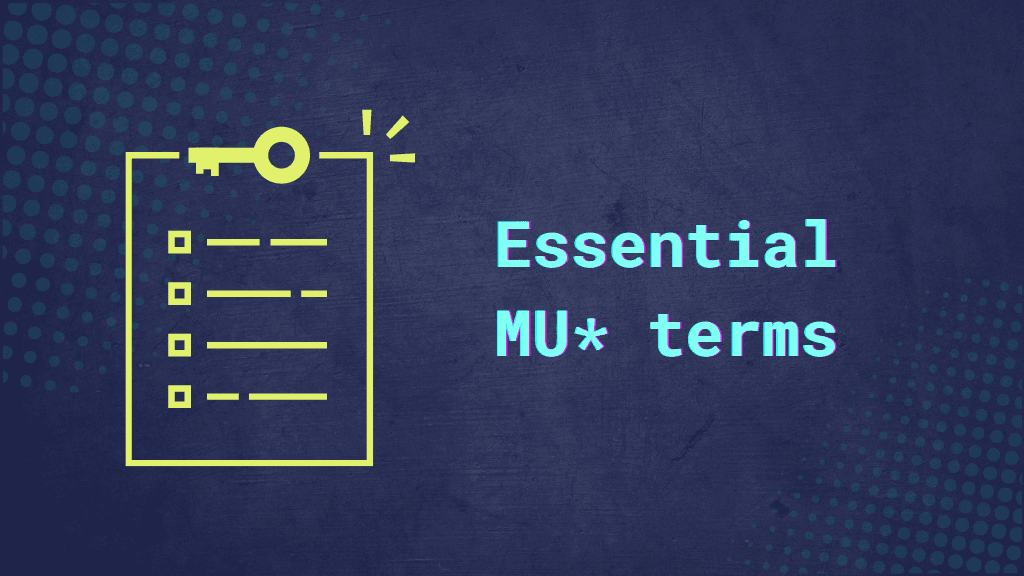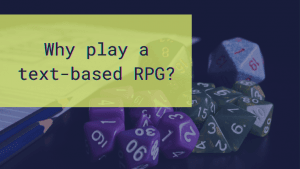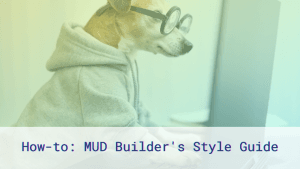Tired of sounding like a newb? Below is a curated list of terms commonly used by the MU* community.
Adding these terms to your lexicon will help you better understand the world of multi-user games played using text, including MUDs, MOOs, and MUSHes.
I’ve also provided some additional glossary resources at the end of this post for related niches.
Looking for the full list of terms? See the new and improved Text Game Glossary for a complete list of text-based gaming terms and their meanings, not just those used in MU*s!
List of MU* terms and their meanings
Not surprisingly, much of the terminology and slang used in other types of online multiplayer games (MMORPGs, MOBAs, etc.) are also used by the text-based gaming community.
That’s because many of the words we use today gained widespread use in the ’90s, when multi-user text games were entering their heyday of popularity.
The curated wordlist below aims to introduce terms that either became popular because of MU*s or only make sense in the context of MU*s.
25 essential terms from MU*s
- ASCII art – Art or graphics created using text characters. Still popular among many multi-user dungeons in lieu of images but not very screen reader-friendly.
- builder – Someone who creates the rooms, areas, objects, and/or NPCs that populate a multi-user dungeon (MUD).
- CCC – Short for “computer-controlled character.” More commonly called an NPC or mob.
- chargen – A process or area in a game devoted to the creation (generation) of new player characters (PCs).
- codebase – The underlying server (software) upon which a multi-user dungeon (MUD) game is built. The codebase determines things like what kind of commands players can use and how to handle combat, turns, actions, skills, and events.

- emote – A freeform way of describing your character’s actions. In MUDs, emotes are often compared to socials, which are coded actions that require only one or two commands to initiate, and says, which are just for dialogue.
- helpfile – A document that helps explain some aspect of the game, such as how the combat system works or how to use a specific skill or spell. See this guide to help systems for more info.
- imm – Short for “immortal.” A member of the game’s staff. Also sometimes referred to as a “wizard.” In some games, admins represent deities in the game’s lore. They typically cannot be killed or injured except by an immortal with higher privileges.
- linkdead – When a character is still present in the game world, but the player has been disconnected. Similar to “idling out.”
- mob – Short for “mobile.” In MUDs, mobs are a type of non-player character that exists in the game world.
- mobprog – Sometimes shortened to “mprog”. In MUDs, it’s a type of script (or “mobile program”) that allows NPCs to perform actions, such as greet players, pick up treasure, attack other monsters, etc.
- MOTD – Short for “message of the day.” A message displayed on login or when connecting to a game or chatroom server. While MOTDs aren’t unique to MUDs, MUDs still retain the text-based format.

- MUD client – A software program that allows players to connect to MUDs hosted by individuals around the world.
- mudsex – An intimate or erotic scene roleplayed in a MUD. Also sometimes called “moosex” and “Tinysex.”
- permaban – A permanent ban. Usually reserved for the worst kinds of offenses. Some games also feature something called “permadeath,” which is when characters who die cannot come back to life.
- pwipe – Deletion of player files, a reset. Some games undergo a regular pwipe so that players can replay the game differently. Another common MUD word that shortens “player” this way is “pbase.”
- remort – To start over with enhanced abilities after maxing out one’s levels or experience. Only some MUDs and codebases offer a remort system.
- rent – A way for players to ensure that their inventory and equipment would persist in the game world between logins, back when computer resources were limited. Sometimes still seen in older games and codebases but mostly phased out thanks to modern hardware.
- RPI – Short for “roleplay intensive” MUD. Describes games for which the main purpose is roleplay, as opposed to simply “roleplay encouraged” or “roleplay welcome.”
- room – A location in a MUD that can be occupied by player characters. In this context, a room can be a literal room in a building, or it can be anything from a forested area to a spot along a seabed.
- script – In the context of MUDs and MUD clients, scripts are instructions, written as lines of code, that tell the client how to behave. Scripts are extremely useful for automating tedious, repetitive tasks.
- soundpack – A collection of audio files (sound effects and/or music) that can be loaded into a MUD client to enhance gameplay. Soundpacks are also useful for providing audio cues to players with visual disabilities.
- puppet – To take control of an NPC for the purposes of providing roleplay or furthering a story. Puppeting is usually done by admins or storytellers.
- wizard – Similar to “imm” or “immortal.” Someone with elevated privileges on a MUD. An admin or staffer.

Other word lists and RPG glossary resources
The list above isn’t intended to cover every possible term or slang word. There are other pages out there that delve more deeply into niche roleplay culture.
Depending on your interests, here are a few glossary resources you might find useful:
- Glossary of Fan Culture / Fandom Terms
- Glossary of Video Game Terms
- List of RPG Game Terms (includes terms used in tabletop games, video games, etc.)
- A master list of Social Media / Blogging RP Terms by Evansyhelp
- Disability Language Style Guide – not a glossary but helps interact respectfully with players who have disabilities
Frequently Asked Questions
What does RPG mean in gaming?
RPG stands for roleplaying game. In RPGs, players take on a role in a story and make decisions on behalf of their character, often using dice rolls or similar mechanics to determine failure or success.
RPGs can take the form of tabletop games, video games, and text-based games.
What’s the difference between rollplaying and roleplaying?
Rollplaying means playing the game to win. When you rollplay, you focus on maximizing your character’s skills, stats, and abilities and mastering the game’s mechanics in order to succeed (i.e. win through every roll of the dice).
In contrast, a focus on roleplaying means playing the game in a way that is true to the character, even if that character has flaws, might fail, or is prone to making mistakes.






Leave a Comment